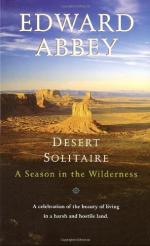|
This section contains 5,341 words (approx. 18 pages at 300 words per page) |

|
SOURCE: Burrows, Russell. “Ontology vs. Epistemology: The Philosophical Dynamic Driving Edward Abbey's Desert Solitaire.” Western American Literature 35, no. 3 (fall 2000): 284-97.
In the following essay, Burrows applies Abbey's background in philosophy to his treatise Desert Solitaire.
Desert Solitaire (1968), Edward Abbey's most important piece of exposition, has usually been approached from perspectives that are either rhetorical/literary or more specifically ecological. But Abbey's remarkable book is seldom studied in what would seem a natural context: philosophy. The tendency has been to skip Abbey's considerable background in philosophy as an incidental to his career as a nature essayist and an econovelist.1 One of Abbey's famous personality quirks was his ambivalence for academics, and yet he had been enough of a philosophy/English major at the University of New Mexico to have won a Fulbright scholarship to Edinburgh, Scotland, and, on returning to Albuquerque, to have completed “Anarchism and the Morality of...
|
This section contains 5,341 words (approx. 18 pages at 300 words per page) |

|


